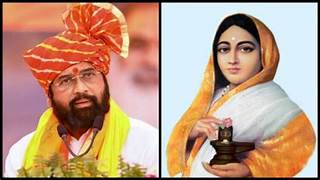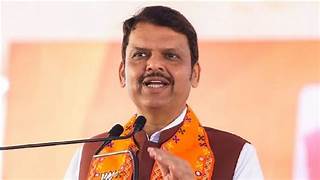Ahilyadevi’s Temple Restorations and Welfare-Oriented Rule Cited as Timeless Contributions Amid Mughal Era Decline
Published on: May 31, 2025
By: BTNI
Location: Pune, India
Maharashtra Chief Minister Devendra Fadnavis paid glowing tribute to the legacy of Ahilyadevi Holkar, the iconic ruler of the Holkar dynasty, crediting her with safeguarding and revitalizing India’s spiritual and cultural heritage during some of its most turbulent periods. Addressing a public event in Pune, Fadnavis drew attention to how Ahilyadevi’s vision and actions continue to inspire modern India.
“When India was reeling under repeated foreign invasions, it wasn’t just political sovereignty that was under attack — it was the very soul of Bharat Mata. Sacred places like Ram Mandir, Jyotirlingas, and Shakti Peeths were targeted systematically,” said Fadnavis, referencing the Mughal ruler Aurangzeb’s aggressive campaign against temples and indigenous faith practices.
Ahilyadevi Holkar, who ruled the Malwa region in the 18th century from her capital in Maheshwar (present-day Madhya Pradesh), is widely respected for restoring dozens of temples and dharmic sites across the country — from Kashi Vishwanath in Varanasi to the Vishnupad temple in Gaya, from Somnath in Gujarat to Rameswaram in Tamil Nadu. Her efforts were not limited to her own dominion but encompassed a pan-Indian vision of spiritual rejuvenation.
“She didn’t wait for governments or permission. She restored faith by rebuilding what foreign rulers had razed. Under her rule, India’s spiritual lifelines were revived with dignity and devotion,” said Fadnavis.
Calling her a true nation-builder, the CM criticized the colonial-era historical curriculum that, according to him, conveniently skips over figures like Ahilyadevi. “Our children are taught that the Mughals left and the British came, as if nothing significant happened in between. But leaders like Ahilyadevi Holkar built the moral and cultural bedrock of this nation,” he asserted.
Fadnavis emphasized that Ahilyadevi’s 28-year reign was a rare example of enlightened monarchy, where development, law, justice, and dharma coexisted harmoniously. “She was a ruler who personally oversaw the welfare of her people. Roads, dharamshalas, water tanks, schools, and temples — all were built under her supervision. Yet, she lived simply and earned the title Punyashlok — a virtuous one,” he said.
Also read- https://www.btnewsindia.com/dr-shrikant-eknath-shinde-declares-zero-tolerance-for-terrorism-in-parliament/ https://www.btnewsindia.com/corporate-financial-reporting-from-hard-copies-to-digital-qr-codes/
The Chief Minister said the state government will work toward incorporating more historical narratives of such unsung heroes into the educational curriculum and cultural discourse. “We must honor and celebrate leaders who preserved India’s soul when it was under siege — Ahilyadevi Holkar is one such icon,” he added.
He also hinted at plans to establish commemorative programs and restoration drives in Maharashtra to mirror Ahilyadevi’s spirit of civilizational continuity. Scholars, spiritual leaders, and historians present at the event supported the CM’s call to re-evaluate and expand the historical spotlight to include forgotten figures of India’s resistance and resilience.
The legacy of Ahilyadevi Holkar, long remembered in spiritual circles but often underrepresented in mainstream history, seems poised to receive renewed recognition under this initiative.




